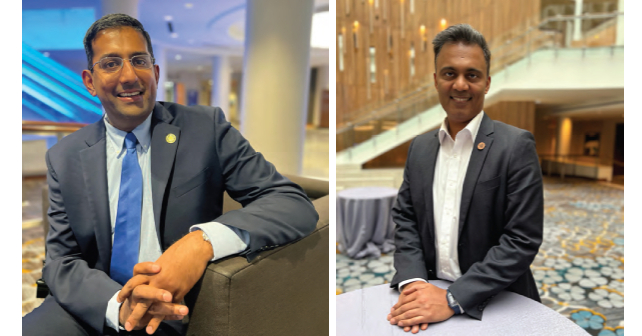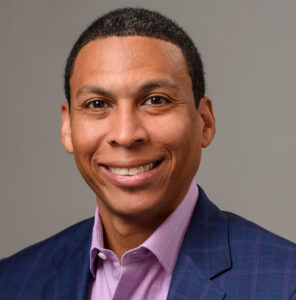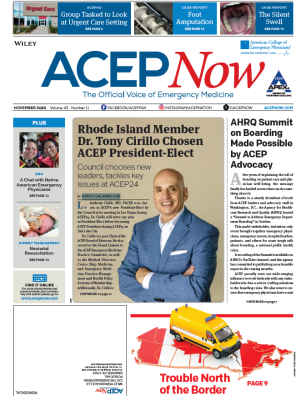
During the recent Leadership and Advocacy Conference (LAC) in Washington, D.C., I met with two emergency physicians who are currently elected to their state legislature, Amish Shah, MD, MPH, and Arvind Venkat, MD, FACEP.
Explore This Issue
ACEP Now: Vol 42 – No 06 – June 2023DR. AMISH SHAH
Dr. Shah: I’m in the state legislature in Arizona and I’ve learned a lot about politics during that time [five years]. I got into this because of public service. That is the motivation. I was practicing medicine for 15 years and realized that you can control what happens within the four walls of the ER, but you can’t control what comes in through the front door. Public policy and politicians help decide how that works. I saw that you could multiply your effect many times forward. So it was in that mindset that I decided to run for office for the very first time in 2017, and I won my first election in 2018. I’ve won three elections total now all in resounding fashion. Over the last five years in the Arizona House, my philosophy has been to think critically about the issues in front of us, to read the bills, to consider everybody’s viewpoints, to invite people into the conversation, to make arguments for and against every bill and think about the constituents.

Dr. Shah
My campaign style has been focused on knocking on doors. I’ve knocked 15,000 doors personally. This is not volunteers. I’ve had other volunteers knocking doors, but myself, I’ve knocked on 15,000 doors and the constituents have appreciated that because I’m willing to listen to what they have to say and consider different viewpoints. Listening, thinking about the needs and the problems that constituents have, and then trying to craft solutions to get at those problems, that’s the biggest thing politicians are really responsible for.
I’m the ranking member now on the House Health and Human Services Committee And I’ve had a lot of success, a track record of success.
I think the approach has always been to treat everybody there with dignity and respect, members of the other party, members of your own party that you don’t agree with, and try to think about what they have to say, find areas where you can work with people proactively.
I’m a Democrat and I have had more bills passed out of committee, more bills out of the chamber and more bills signed into law by a Republican governor than any member of my party.
Dr. Dark: What’s one of the most important things that you’ve done while you’ve been in office?
Dr. Shah: The first thing that comes to mind are bills that started with a constituent idea and then it ended up getting signed in the law. A guy who came to me whose son had muscular dystrophy. He was going to the doctor and getting that doctor’s prior authorization forms and filling them out because the doctor’s staff was so backed up that they couldn’t fill them out on time and his son was suffering for lack of care. So I said, this has to be streamlined.
I sponsored a bill to streamline the prior authorization process, simplify it so that it’s a single two-page form standardized across the entire state. I created a win for patients, a win for physicians, and even the insurance companies because it reduced a lot of their cost on the backend.
Another one specifically for emergency medicine is the non-retaliation bill, which ACEP eventually took as a national resolution and pushed it out to the 50 state houses. It started with an emergency physician who was working and he saw a non-medical person monitoring the telemonitors, which is not really monitoring, is it? He did the appropriate thing by relaying his concern and he was taken off the schedule, presumably in retaliation. But Arizona law did not account for that particular circumstance because he wasn’t employed by the hospital. The whistleblower law at the time said that the hospital or employer couldn’t terminate you, but it didn’t say anything about third parties. We had this updated to include third parties.
The third bill, violence against health care providers, partnered up with the nurses who are our chief sponsors on this. But it absolutely affects emergency physicians because I’ve been assaulted in the ER, as most of my ER colleagues have been. We made a major push and I was able to get that again signed into law. It was in another lawmaker’s name, but it was important to get that done and I’m thankful to ACEP Now for featuring it a couple years ago.
Dr. Dark: You want to make your next career move a DC move. What do you want to get accomplished at the federal level?
Dr. Shah: A lot of what happens in health care overall is decided at the federal level. We have patients that are out there that have no coverage. That is a problem. As we all know, we end up doing a lot of primary care in the emergency department. We end up seeing a lot of patients that cannot pay. Those patients don’t necessarily have the best outcomes. The cost of care is extraordinarily high. There is an efficiency problem here too, where we are spending twice as much per capita as many other countries and not getting the outcomes and not covering everybody, so something’s got to give.
Too much money, I believe, is being wasted in the administration aspects. And we just really need to say to ourselves, can we focus some of those dollars on getting them back to physicians, hospitals, providers, and making the system more efficient? I think reducing regulatory burden on some physicians, I’m specifically thinking about our primary care physicians, our family physicians, is super important. Increasing GME spots is super important so that we have adequate number of providers for the entire country.
In a place like Arizona, I have to think about my voters and they’re experiencing extremely long delays when it comes to finding outpatient appointments. I can’t tell you the number of patients that I see in the ER, some huge percentage that don’t want to be discharged because they know that getting an outpatient appointment will be weeks to months.
They want you to take care of everything there or admit them because they know that their problems won’t get taken care of in a timely manner.
Dr. Dark: I’ve heard you burn through a lot of sneakers in knocking on all these doors. What shoes do you primarily wear for this exercise?
Dr. Shah: Believe it or not, I wear a very comfortable dress shoe. I don’t wear sneakers. I show up in business casual at most of these doors. In Arizona in the summer, we’re talking about 120-degree days. So in order to keep knocking, I had to improvise because I suffered from heat exhaustion more than once and nearly collapsed on the street several times.
When you do this alone, it can be kind of scary. So I bought two vests that were about $200 each. And they contain a material that is kind of like ice that is built into the vest, and you pop into the freezer overnight and you put one of them in your car in a cooler, and I would take them out with me. Each one would last about three hours. So I would go knocking with an ice vest on underneath my shirt. So when was 120 out, underneath my shirt, I was at 60 degrees. And it kept me cool, then knocked for three hours.
I would stop at a restaurant, eat lunch, change the vest out to the other vest, and then keep going for three more hours. And that’s how I was able to keep going through the 120-degree heat. It became something that I got known for in the state of Arizona—the ice vest.
DR. ARVIND VENKAT
Dr. Venkat: I’m a state representative for the 30th legislative district in Pennsylvania, which is the North Hills suburbs of Pittsburgh.
Dr. Cedric Dark: What do you feel is the most similar thing what you’re doing now with emergency medicine?

Dr. Venkat
Dr. Venkat: The key thing as a state representative, whether as a candidate or as an office holder, is to make that quick trusting connection with an individual, with a voter, with constituent. And we do that as an emergency physician all the time in the emergency department. We see complete strangers in a time of crisis and we establish a quick and trusting relationship with that individual. In many ways, that one-on-one connection that you need to establish with people in your community and voters is the same thing that we do as emergency physicians on a day-to-day basis.
Dr. Dark: Okay. What’s the most different?
Dr. Venkat: Oh, asking people for money. As an elected official, especially as a state representative where you have two-year terms, you’re essentially running all the time. And so part of the political process is raising money. And that’s clearly not something we generally have to do as emergency physicians. We’re fortunate to have a good salary to be able to support our families. And so financial pressures are there, but not in the same way as what happens in a political campaign.
Dr. Dark: Why’d you make that sacrifice to become a public servant?
Dr. Venkat: I had been very involved with the ACEP. I’ve been very involved with the Pennsylvania ACEP and I had gotten involved with ACEP because of advocacy. I had seen what happens outside the four walls of the emergency department, whether we’re talking about the opioid crisis or scope of practice or malpractice or even just being able to care for patients in a resource-limited environment. A lot of the decisions that were being made in state and government had a direct impact on that. And when COVID hit, I happened to be president of the state emergency physicians’ chapter in Pennsylvania. And so I was very involved with our state government and with the local community about how to stay safe and move forward.
And what really motivated me to run was seeing over the course of the two or three years at the height of the pandemic how divided we were and how we needed more people with perspectives from health care and science in the political arena to be able to inform public policy. I very much focused on investment in our first responders and making health care more affordable and accessible because we saw during the height of the pandemic how challenged that was. And so that’s what motivated me to get involved in public office.
Dr. Dark: What have you learned in the time you’ve been in the Pennsylvania House?
Dr. Venkat: The most important thing I’ve learned is that there’s a real hunger among government officials for people who have backgrounds in health care and in science to be involved in the public arena. I know when I was president of the Pennsylvania chapter, I didn’t necessarily think that there was a lot of attention paid to our voice in the advocacy process. But now being on the inside, I get calls from people on both sides of the aisle saying, “What do you think about this? And how is this going to affect my constituents in terms of their receiving healthcare?” Or, “What are the implications of this?” So I’ve been very gratified and humbled to be a resource for my colleagues on both sides of the aisle in terms of trying to generate good policy in the area of health care.
Dr. Dark: What do you hope to get accomplished in the short-term and long-term?
Dr. Venkat: My major legislative priority for this legislative session is medical debt relief for impoverished Pennsylvanians. There are examples in local government across the country where small amounts of money being appropriated in partnership with charitable groups that can identify and discharge or dismiss medical debt can make a huge difference for thousands of people.
These are our patients who we see who don’t get care elsewhere or are scared to get care because of the cost of health care and the debt that they incur.
Over the medium and long-term, I’m very fortunate to be the only physician in our general assembly and to be on committees that have jurisdiction over health care. So I’m very focused on, how do we make health care more affordable and accessible for the people in my district and for all Pennsylvanians? We have a health care staffing crisis. The cost of health care is prohibitive. Insurance coverage can feel like you don’t actually have insurance. We have scope of practice issues. So I think on all of those issues, my voice as a physician in the legislature can be helpful. That’s what I plan to focus on.
 Dr. Dark is an associate professor of emergency medicine at Baylor College of Medicine and the medical editor in chief of ACEP Now.
Dr. Dark is an associate professor of emergency medicine at Baylor College of Medicine and the medical editor in chief of ACEP Now.



No Responses to “Emergency Physicians as State Legislators”